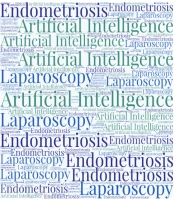Dear Editor,
Nowadays, artificial intelligence (AI) is increasingly used in the medical industry, primarily machine learning (ML) as one element of AI (1). Specifically, AI has been suggested in the gynecological field, especially imaging and ultrasound, to assess the uterus (2) and classify ovarian cysts. As far as we know, no studies have analyzed the possible function of AI in diagnosing endometriosis. Artificial intelligence technologies are promising in medicine to help physicians with diagnostic and therapeutic problems.
The introduction of AI in midwifery and gynecology has shown great potential. Artificial intelligence for interpreting cardiotocography (CTG) has increased its sensitivity from 60% to 94%, with a specificity of 91% (1). In breast imaging, AI is part of everyday clinical practice. Artificial intelligence showed a 5.7% decrease in false-positive results and a 4.9% decrease in false-negative results in mammography screening interpretation, according to US-licensed radiologists participating in the McKinney et al.’s study (2). Hence, it is inevitable that AI will lead to non-invasive diagnoses in women, especially endometriosis (2, 3).
The gold standard for diagnosing endometriosis is minimally invasive laparoscopy. This procedure is often difficult, costly, and time-consuming for even the most experienced laparoscopic surgeons, as the patient’s condition and characteristics may prevent accurate assessment of anatomical structures. Laparoscopic surgery can cause dangerous complications and health problems for women. The introduction of AI can be a significant step in diagnosing endometriosis non-invasively (4).
Future AI research in diagnosing endometriosis will likely focus on improving machine learning algorithms. This will be achieved through managing datasets, properly using convolutional neural networks and repetitive neural networks, and integrating several models into one end-to-end model. Finally, validating machine learning algorithms with large heterogeneous datasets ensures the generalization of results to different populations. Artificial intelligence seems to be the first step in the diagnosis of endometriosis. Inevitably, the use of artificial intelligence in the diagnosis of endometriosis raises essential questions. Does data interpretation require human supervision, or can we rely on AI? Who is responsible for misdiagnosis? Does relying on automation provided by AI destroy technical skills and experience? Does AI reduce the workload of medical professionals or replace them altogether?
The application dimensions of AI in health care are only recently becoming apparent, and the scientific community is only beginning to address many of the critical issues that arise. In the study of Guerriero et al., 106 women with a final diagnosis of rectosigmoid endometriosis were studied using AI (3). Regarding diagnostic accuracy, the neural network model was the best (accuracy 0.73, sensitivity 0.72, specificity 0.73, positive predictive value 0.52, and negative predictive value 0.86). The accuracy of ultrasound markers in suspecting rectosigmoid endometriosis using AI models had similar results to the logistic model (3). The sensitivity and specificity of AI in the study of Bendifallah et al. for the diagnosis of endometriosis ranged from 0.82 to 1.0 and 0.91 to 0.95, respectively (5).
Data from a few studies worldwide show that AI can be a good screening test for clinicians (6, 7). The introduction of ML in these settings represents a significant change in medical evaluation because AI can replace diagnostic laparoscopy.
